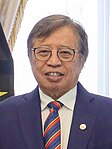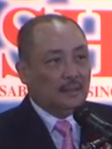Next Malaysian general election
| |||||||||||||||||||||||||||||||||||||||||||||||||||||||||||||
All 222 seats in the Dewan Rakyat 112 seats needed for a majority | |||||||||||||||||||||||||||||||||||||||||||||||||||||||||||||
|---|---|---|---|---|---|---|---|---|---|---|---|---|---|---|---|---|---|---|---|---|---|---|---|---|---|---|---|---|---|---|---|---|---|---|---|---|---|---|---|---|---|---|---|---|---|---|---|---|---|---|---|---|---|---|---|---|---|---|---|---|---|
| |||||||||||||||||||||||||||||||||||||||||||||||||||||||||||||
| |||||||||||||||||||||||||||||||||||||||||||||||||||||||||||||
General elections must be held in Malaysia by 17 February 2028. Redistribution and boundary changes for the constituencies are expected to take place by 2026, with the last taking place before the 2018 general election.
Prime Minister Anwar Ibrahim, leader of Pakatan Harapan, currently leads a coalition government consisting of PH, BN, GPS, GRS, WARISAN and other minor parties.[1] Perikatan Nasional (PN) and the Malaysian United Democratic Alliance (MUDA) currently sit as the opposition.[2][3]
The 2022 general election saw PN make gains primarily in the northern peninsular states of Perlis, Kedah, Kelantan, and Terengganu in what was dubbed as the Green Wave.[4][5][6][7][8][9] It resulted in a hung parliament for the first time in Malaysian electoral history.
Electoral system
Elections in Malaysia are conducted at the federal and state levels. Federal elections elect members of the Dewan Rakyat, the lower house of Parliament, while state elections in each of the 13 states elect members of their respective state legislative assembly. As Malaysia follows the Westminster system of government, the head of government (Prime Minister at the federal level and the Chief Ministers, the so-called Menteri Besar, at the state level) is the person who commands the confidence of the majority of members in the respective legislature – this is normally the leader of the party or coalition with the majority of seats in the legislature.
The Dewan Rakyat consists of 222 members, known as Members of Parliament (MPs), that are elected for five-year terms. Each MP is elected from a single-member constituency using the first-past-the-post voting system. If one party obtains a majority of seats, then that party is entitled to form the government, with its leader becoming the Prime Minister. In the event of a hung parliament, where no single party obtains the majority of seats, the government may still form through a coalition or a confidence and supply agreement with other parties. In practice, coalitions and alliances in Malaysia generally persist between elections, and member parties do not normally contest for the same seats.
Notes
References
- ^ "Parliament session on Dec 19, motion of confidence on PM to be tabled - PM Anwar". Bernama. 24 November 2022. Retrieved 15 December 2023.
- ^ "PN to stay as opposition bloc, to provide checks and balances to Anwar's unity govt". The Straits Times. 25 November 2022. Retrieved 15 December 2023.
- ^ "Syed Saddiq: Muda turns opposition as 'third force', withdraws from unity govt". Malay Mail. 10 September 2023. Retrieved 15 December 2023.
- ^ "Malaysia's 'Green Wave' Was a Long Time Coming". Fulcrum Singapore. 26 January 2023. Retrieved 15 December 2023.
- ^ "'Green wave' sweeps over voters". The Star. Retrieved 15 December 2023.
- ^ "Iman Research: PAS' 'green wave' long time coming, came from lack of Pakatan presence and winning over first-time voters". Malay Mail. 20 January 2023. Retrieved 15 December 2023.
- ^ "'Gelombang hijau' PAS akan berkembang dalam PRN, kata Hadi". Free Malaysia Today. Retrieved 15 December 2023.
- ^ "ULASAN Kejutan 'Gelombang Hijau' dalam PRU15". Malaysia Kini. 30 November 2022. Retrieved 15 December 2023.
- ^ "Bangkitnya 'gelombang hijau' di Malaysia". Benar News. Retrieved 15 December 2023.






